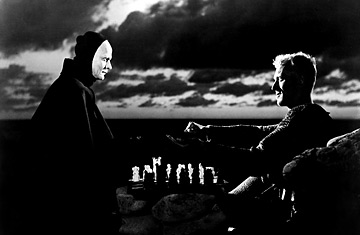
Regarded as one of the most significant films ever made, Bergman's first masterpiece features Max von Sydow and Bengt Ekerot as Death.
(3 of 3)
Over the decades he acquired five wives, nine children (that we know of) and plenty of actress-concubines, some of whom he made stars and who helped shape his work. The smoldering sexual allure of young Harriet Andersson inspired Bergman's dark, daring dramas of the early '50s: Summer With Monika and The Naked Night. Bibi Andersson, of the fresh face and buoyant spirit, was his next live-in love; she anchored the mid-'50s films that brought Bergman his international esteem. He met Ullmann in 1964, and wrote Persona — the film that reestablished him as an artistic pioneer — in part so he could be with her. Ullmann became his muse for the next decade, most indelibly in the TV-serial-turned-film Scenes from a Marriage. She would also direct films from two of his late scripts, Private Confessions and Faithless, and star in his last work, Saraband, a sequel of sorts to Scenes from a Marriage.
As Bergman's reputation grew, so did those of his on-screen company. He exported his actors (notably von Sydow) and actresses (Ullmann, Bibi and Harriet, Ingrid Thulin, Olin) to be glamorous staples of European art cinema and the occasional American film. But though Bergman was frequently financed by U.S. companies, he never went Hollywood; his only English-language movie, The Touch (with Elliott Gould and Bibi Andersson), was filmed in Europe.
A tax dispute with Swedish authorities exiled him to Norway and Germany for a few years, where he made The Serpent's Egg (with David Carradine), Autumn Sonata (with that other famous Bergman, Ingrid) and From the Life of the Marionettes. But Sweden, love it or hate it, was the home he loved to be estranged from, and he returned there, to Faro and the isolated island of his mind. In TV interviews, Bergman could be a charming, engaging fellow. But his films were truer reflections of "the solemn Swede," as he was called then.
REDISCOVERING BERGMAN
Or, as he is known now: "Who?"
A filmmaker will naturally lose some of his celebrity when he stops making films. Bergman officially retired from movies in the mid-'80s, though he kept directing plays; and he wrote film scripts that were directed by Ullmann, his son Daniel (Sunday's Children) and Bille August (The Best Intentions). But the vogue had passed. He'd had a lock on the high end of popular culture, but by the '80s there was no high end; low was now high. A tribute song by Van Halen, The Seventh Seal ("broken now I can't help but feel / someone cracked the seventh seal / nothing sacred, nothing left unturned / when nothing's simple / then nothing's learned / so take me down to the virgin spring / wash away my suffering, oh"), was itself an anachronism.
The Bergman critical consensus also evaporated. His films were dismissed as stage-bound, not real movies because they talked so much, and morbidly full of themselves. As the cultural climate changed, he didn't, and the fashion that Bergman had started and flourished in came back to bite him — and then, worse, to forget him. Hardly anyone (except this one) still thought of him as the world's greatest filmmaker.
To the young, Bergman's was not a name worth knowing — though they might be expected to connect with the dark, near-suicidal introspection of his films, with their sense of a tortured psyche swirling into the quicksand of its own making. In 2005, when I proposed a TIME feature on Bergman to coincide with the U.S. release of Saraband, none of the college-age interns that summer had heard of him.
Now, though, his name will be in the papers, on TV and the web sites. The Ingmar Bergman brand has a last chance to interest, and addict, those for whom serious foreign films now just sound like homework. If they take a look, they will find the pleasures films can offer: personal dilemmas with universal reverberations; beautiful women suffering deeply and gorgeously; excoriating drama as enthralling entertainment; the ineffable made visible. It's the right time, and past time, for a new generation of Bergmaniacs. They will find that there's nothing more invigorating than total immersion in the dark night of Bergman's soul.
